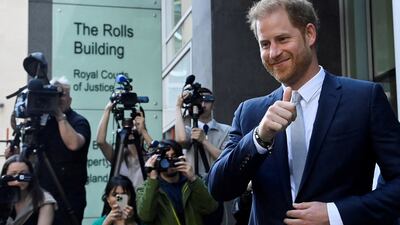Prince Harry's phone was hacked by Mirror Group Newspapers, a High Court judge has ruled following a trial.
The Duke of Sussex has been awarded £140,600 ($180,000) after bringing the claim against the tabloid newspaper publisher at the High Court.
The prince, 39, who gave evidence to the court during the trial, sued MGN for damages, claiming journalists at its titles – the Daily and Sunday Mirror, and Sunday People – were linked to methods including phone hacking, so-called blagging or gaining information by deception, and the use of private investigators for unlawful activities.
Mr Justice Fancourt concluded there was “extensive” phone hacking generally by MGN from 2006 to 2011, “even to some extent” during the Leveson Inquiry into media standards.
The judge also ruled that the duke’s phone was probably hacked “to a modest extent” by the publisher.
In a summary of his ruling, he said he found that 15 out of the 33 articles that were tried were the product of phone hacking of Prince Harry's mobile phone or the mobile phones of his associates, or the product of other unlawful information-gathering.
“I consider that his phone was only hacked to a modest extent and that this was probably carefully controlled by certain people at each newspaper,” he said.
“There was a tendency for the duke in his evidence to assume that everything published was the product of voice mail interception because phone hacking was rife within Mirror Group at the time.
“But phone hacking was not the only journalistic tool at the time and his claims in relation to the other 18 articles did not stand up to careful analysis.”
He added: “I recognise that Mirror Group was not responsible for all the unlawful activity that was directed at the duke, and that a good deal of the oppressive behaviour of the press towards the duke over the years was not unlawful at all.
“Mirror Group therefore only played a small part in everything that the duke suffered and the award of damages on this ground is therefore modest.”
Reading a statement on the Duke of Sussex’s behalf outside the High Court, his lawyer David Sherborne said: “Today is a great day for truth, as well as accountability.”
In a statement, MGN said: “Where historical wrongdoing took place, we apologise unreservedly, have taken full responsibility and paid appropriate compensation.”
Piers Morgan named in court
Mr Justice Fancourt ruled that he accepted the evidence of biographer Omid Scobie, who told the High Court that then-Daily Mirror editor Piers Morgan was told about the use of phone hacking.
During the trial earlier this year, the court was told that Scobie did work experience at the Daily Mirror in spring 2002 and overheard Morgan being told that information relating to singer Kylie Minogue and her then-boyfriend James Gooding had come from voicemails.
After the judgment, Morgan insisted he had “zero knowledge” of the single article published in his time as editor of the Daily Mirror that may have involved illegal information gathering.
He described those giving evidence in the Duke of Sussex’s High Court case as “old foes of mine with an axe to grind”.
The prince's case was heard alongside similar claims brought by actor Michael Turner, who is known professionally as Michael Le Vell and is most famous for playing Kevin Webster in Coronation Street, actress Nikki Sanderson and Fiona Wightman, the former wife of comedian Paul Whitehouse.
The allegations in their claims about unlawful activity at MGN’s titles covered a period from as early as 1991 until 2011, the court was previously told.
Delivering his verdict and awarding £140,600 on Friday, Mr Justice Fancourt said: “I have also awarded a sum for aggravated damages, to reflect the particular hurt and sense of outrage that the duke feels because two directors of Trinity Mirror plc, to whom the board had delegated day-to-day responsibility for such matters, knew about the illegal activity that was going on at their newspapers and could and should have put a stop to it.
“Instead of doing so, they turned a blind eye to what was going on and positively concealed it. Had the illegal conduct been stopped, the misuse of the duke’s private information would have ended much sooner.
The high-profile trial ended in June after seven weeks of evidence from dozens of witnesses, including former journalists, editors, private investigators and MGN executives.
Many other witnesses also submitted written evidence, such as the friends, family and colleagues of those bringing cases against the publisher.
Prince Harry faced eight hours of questioning over two days during a witness box appearance that drew the attention of the world’s media.
MGN largely contested the claims and denied that any of the newspaper articles in question had resulted from phone hacking, while contending the vast majority did not arise from any other unlawful activity.
The publisher made a limited number of admissions of unlawful activity in relation to the duke, Sanderson and Ms Wightman, for which the publisher apologised and accepted they will be entitled to some damages, but denied the majority of their claims and Turner’s entire case.


